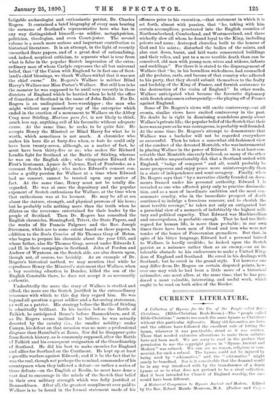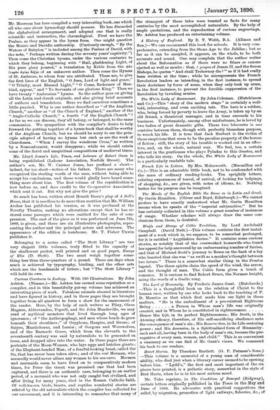Mr. Moorsom has here compiled a very interesting book, one
which all who care about hymnology should possess. He has discarded the alphabetical arrangement, and adopted one that is really scientific and instructive, the chronological. First we have the Psalms, as they appear in the hymn form. One might question the Mosaic and Davidic authorship. (Curiously enough, "By the Waters of Babylon" is included among the Psalms of David, with the note, "Perhaps written duringthe seventy years' captivity.") Then come the Christian hymns, under the various centuries to which they belong, beginning with "Hail, gladdening Light, of His pure glory poured," a translation by Keble from the Os ZA.ap6r tryfas 344ns of an unknown author. Then come the Hymns of St. Ambrose, to whom four are attributed. These are, to give the first lines of the English, "0 Jean, Lord of light and grace," "0 Trinity, most Blessed Light," "0 Come, Redeemer of Man- kind, appear," and "Ye Servants of our glorious King." Then we have twenty " Ambrosian " hymns. So the author goes on giving all the Latin and Greek originals, and also giving brief accounts of authors and translators. Here we find ourselves sometimes a little puzzled. Why is one author described as "of the Anglican Church," another as "of the Church of England," another of the " Anglo-Catholic Church," a fourth "of the English Church "P As far as we can discern, they all belong, or belonged, to the same communion. We sympathise with the compiler's desire to help forward the putting together of a hymn-book that shall be worthy of the Anglican Church, but we should be sorry to see the prin- ciple adopted of having no hymns but such as are the work of Churchmen. "When I survey the wondrous Cross," as written by a Nonconformist, would disappear ; while we should retain some of the florid and unspiritual compositions of mediieval times.



















































 Previous page
Previous page